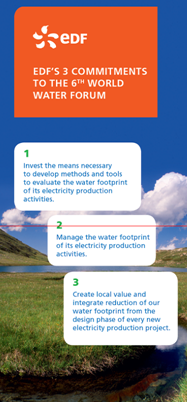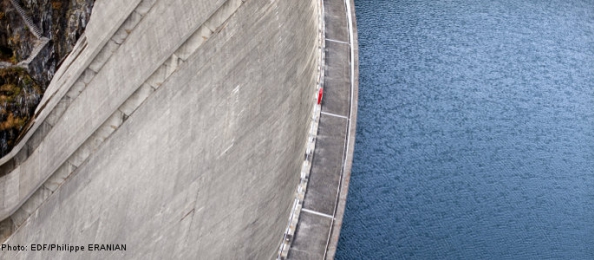Water Management in Action
Water is used in energy production and supply, and, in turn, energy is used for pumping, moving, and treating water. As a result, in a context of climate change, the linkages between both energy and water systems have grown more complex and interdependent.
For many years, the EDF Group has been developing specific skills in the fields of water resources management, meteorological forecast, and environment preservation in order to better optimize its power generation and water resources while protecting ecosystems. EDF operates nearly 500 hydropower plants and has been recognized for its worldwide experience in the design and operation of multi-purpose hydro schemes that deal with agriculture, drinking water, tourism, industry, energy issues that involve a sustainable development perspective.
In the field of thermal power plants (including nuclear), water is needed for cooling systems, either once-through cooling systems or re-circulating cooling systems (tower). Water intake, utilization, and thermal discharge are important parameters in terms of water resources. They are factored into optimization studies for the design, operation, and maintenance of power plant cooling circuits. While these circuits currently rate among the “best available techniques” for industrial cooling systems, efforts are continuously being made to improve their design and operation in order to limit their impact on water resources. Therefore, water is naturally at the heart of EDF’s core business and skills.
Being aware of the current stakes related to the nexus between water, energy, and food, the EDF Group was deeply involved in preparations for the 6th World Water Forum in Marseille in March 2012 – particularly in the key priority topics “Harmonize water and energy” and “Water, energy, food nexus” – and signed a dedicated partnership agreement with the International Committee of the Forum and the World Water Council. Following are the visible and strong commitments made by EDF, in particular regarding the assessment and management of the Group’s water footprint (or impacts) from its electricity generation.

To deepen its knowledge of the synergies between water and electricity, the EDF Group – in conjunction with the scientific community – makes a commitment to invest the necessary means in the development of the methods and tools to estimate the water footprint of its activities of electricity production within the territories that welcome its facilities.
The EDF Group makes a commitment to manage the water footprint of its activities of electricity production. In particular:
- to carry on the improvements in performance in terms of water withdrawal and consumption of existing and future power plants;
- to look for the best possible efficiency of the use of water on the scale of territories and catchment basins.
In accordance with its CSR commitments, when it develops a project for electricity production in a territory, the EDF Group makes a commitment to create some value locally and to minimize its water footprint by integrating elements from the design phase. In particular, the EDF Group will use the Hydropower Sustainability Assessment Protocol of the International Hydropower Association for its hydro projects.
Furthermore, the EDF Group makes a commitment to pursue the work started with the preparation of the 6th World Water Forum on the linkages between water, energy, and food, in particular with the Consortium of International Agricultural Research Centers and International Wetlands, who decided to join this last commitment by pursuing the works on the nexus between water, energy, and food.
| Initiator | EDF |
| Project start | - |
| Status | ongoing |
| Region | worldwide |
| Contact person | |
| Awards |
Project benefit
- Optimizing water management
| Anti-Corruption | - |
| Business & Peace | - |
| Development | - |
| Environment | X |
| Financial Markets | - |
| Implementing UNGC Principles in your Corporate CSR Management | - |
| Human Rights | - |
| Labour Standards | - |
| Local Networks | - |
| Advocacy of global issues | - |
| Business opportunities in low income communities/countries | - |
| Project funding | - |
| Provision of goods | - |
| Provision of services/personal | X |
| Standards and guidelines development | - |
Corporate Responsibility - EDF Group is engaged in preserving Water Resources in all its Activities
Water valuation to optimize water use in the Durance Valley, France
EDF used water valuation to help the decision-making process for optimal water management in the watershed along the 250 km Durance River, in southeast France, with respect to competing multipurpose uses of water. These include agriculture, tourism (fishing, swimming, sailing, etc.), hydropower, drinking water, and flood control. The overall aim was to optimize water allocation between energy generation and irrigation and to develop appropriate incentives for water savings in order to restore financial margins, and to answer future water demand from other users. The value used for water was the energy cost (€/kWh), based on current and future prices in France, linked to energy productivity (m3/kWh) and the volume of water used (m3) by the hydropower plant. The main business argument for the valuation study was to clearly demonstrate the benefits of optimizing water uses for each party and to define the level of remuneration for this savings. The approach adopted was to implement a Water Saving Convention, signed by EDF and the two main irrigators, for a six-year period with the possibility to adjust it if it achieved better results than expected. To balance these efforts, EDF has made a commitment to remunerate the partners for their savings. The deal was so effective that a first additional agreement was signed in 2003 and a second one in 2006 to increase the savings target from 44 to 65 and then to 90 million cubic meters – showing a decrease in agricultural consumption from 310 million cubic meters in 1997 to 201 million cubic meters in 2005. The results showed that, in addition to the volume of water saved, a key benefit was the timing of the water savings because the saved water could be used to generate more electricity during peak periods of electricity demand when electricity prices are higher. Both parties come out ahead, with a third winner being ecosystems, as around 84 percent of the water savings are used for ecological purposes.
UTE Norte Fluminense: Keeping the planet blue
In Brazil, UTE Norte Fluminense (EDF 90%) has put in place a full program to reduce the use of water in its Macaé CCGT power station, in Rio State. The project started three years ago with the identification and reduction of all leaks and the reduction of purges. This first stage also involved ensuring employees were aware and involved. The results were impressive: a 30 percent reduction in water use. In 2011 the station management went further and launched the construction of a rainwater capture system, which allowed them to reduce by a further 5 percent the water extracted from the Macaé River (100,000–150,000 m3 of rainwater is collected per year). Raising the bar further, 2012 saw the launch of a program to collect all processed water in order to re-inject it into the plant’s water circuits. The aim is to reduce water consumption by a further 15 percent. These large investments (€3.8 million), with a payback over 18 years, would not have seen the light of day without the support of the Board of Directors. But there were also indirect benefits: employees who are even more proud of their power station, subcontractors who are more involved, and local groups and NGOs who are on board with a thermal power plant whose operation is focused on respecting the environment. At the same time, UTE is collaborating with a university in Rio on research into reducing water evaporation from cooling towers, which represents 80 percent of water extractions from the river.
This project description was originally presented in the Global Compact International Yearbook 2013.
About EDF Group
Every day tens of millions of businesses and consumers turn to EDF, one of the world’s leading electric utilities, for the electricity they need to keep their homes, offices, and factories running smoothly.
That’s why we at EDF are committed to:
- Giving you a reliable, energy-efficient power supply backed by unbeatable customer service ;
- Ensuring maximum energy safety ;
- Remaining at the forefront of energy technology, whether for nuclear, hydro, wind, or solar power, and leading the drive towards a carbon-free world.
Products
The EDF Group provides a wide range of gas, electricity and energy eco-efficiency services to more than 38 million customer accounts around the world.
Write a comment about this page
Your comments are provided by your own free will and you take sole responsibility for any direct or indirect liability. In order to maintain the highest discussion quality, all comments will be reviewed by our editors. You hereby provide us with an irrevocable, unlimited, and global license for no consideration to use, reuse, delete or publish comments in accordance with our Community Guidelines.
About Us // Privacy Policy // Copyright Information // Legal Disclaimer // Contact
Copyright © 2012-2018 macondo publishing GmbH. All rights reserved.
The CSR Academy is an independent learning platform of the macondo publishing group.









